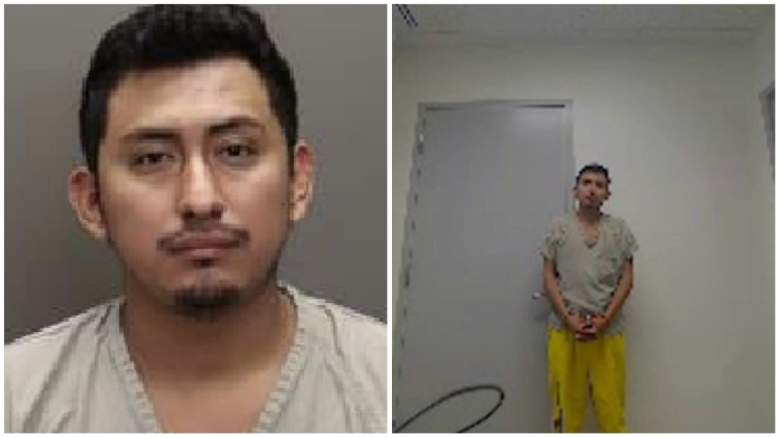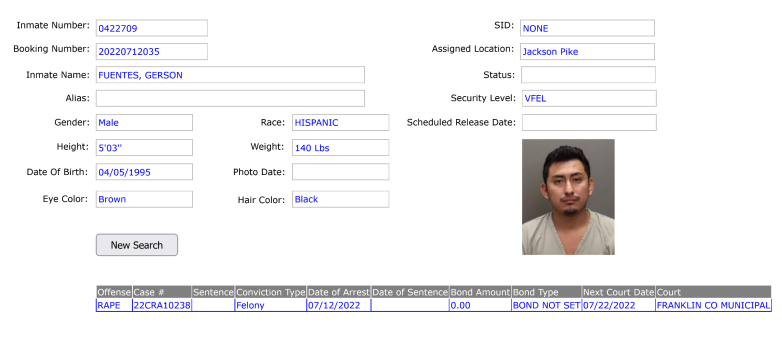
Gerson Fuentes is the 27-year-old man accused of raping a 10-year-old Ohio girl who traveled to Indiana to get an abortion.
The case has leapt to the forefront of the national debate over the U.S. Supreme Court decision overturning Roe v. Wade. Some people had questioned whether the story was true, and President Biden highlighted it, as did proponents of Roe v. Wade.
“Ten years old. Raped, six weeks pregnant. Already traumatized. Was forced to travel to another state. Imagine being that little girl,” Biden said July 9 in a public address.
Jail records show that Fuentes was booked in the Franklin County (Ohio) Jail on July 12, 2022. He has a court hearing on July 22. Bond is $2 million.
Here’s what you need to know:
1. The Girl’s Mother Told Officials About Her Pregnancy, Authorities Say

Franklin Co Jail
Fuentes is accused of rape of a child under age 13, according to Franklin County court records.
He lived in an apartment in Columbus, Ohio, the court records say.
According to the Columbus Dispatch, Fuentes admitted raping the child at least twice.
A detective, Jeffrey Huhn, testified at Fuentes’ arraignment that Columbus police “were made aware of the girl’s pregnancy through a referral by Franklin County Children Services that was made by her mother on June 22,” the newspaper reported.
2. Fuentes Is in the Country Illegally, Reports Say
Fox News reported that Fuentes, who is from Guatemala, is in the United States illegally, citing a source from U.S. Immigration and Customs Enforcement.
ICE has placed a detainer on Fuentes, meaning he would be released into federal custody after he serves any state time, according to Fox.
3. The Child Underwent a Medical Abortion in Indiana
A video of the arraignment, shared by Townhall.com, showed Fuentes appearing in court assisted by an interpreter.
A prosecutor said in the video that the state was asking to hold Fuentes without bail or bond in the case.
Huhn, the detective, testified that the mother indicated her 10-year-old daughter was pregnant. She is no longer pregnant because she had a medically terminated abortion, he said. She had the consultation on June 29. “I believe the procedure was initiated on the 30th. The products of conception were picked up on the 2nd of July,” he testified.
He clarified that he was referring to the aborted fetus. The “products of conception were entered into evidence” for DNA testing, he said.
The abortion occurred in Indianapolis, the Dispatch reported.
The newspaper added that DNA from the aborted fetus at the clinic was being tested against Fuentes and the child’s siblings.
The Dispatch noted that Franklin County Municipal Court Judge Cynthia Ebner “said the case did not warrant Fuentes — who is believed to be undocumented — to be held without bond.”
The girl could not get the abortion on Ohio because, after Roe vs. Wade was overturned, Ohio’s “Heartbeat Law” went into effect, banning “most abortions around six weeks or when the first fetal heartbeat is detected,” according to 10TV.
According to Fox News, the state’s attorney general said “that exceptions to Ohio law would have allowed the girl to obtain an abortion in the state.”
4. Authorities Obtained a Saliva Sample From Fuentes, Who Reportedly Confessed to the Crime
On July 6, according to 10TV, the victim “identified Fuentes to authorities as the person who raped her.”
Less than a week later, detectives took a saliva sample from Fuentes using a search warrant.
He then confessed to the rape, 10TV reported.
The Indianapolis Star broke the story of the girl’s trip out of state to get the abortion. That story names Dr. Caitlin Bernard, an Indianapolis obstetrician-gynecologist, as a physician who provided care for the 10-year-old girl.
It also reported that a supporter of the girl had turned to Bernard for help, saying the girl was six weeks and three days pregnant and, thus, could no longer get an abortion in Ohio.
On the evening of July 13, Bernard spoke publicly, tweeting: “My heart breaks for all survivors of sexual assault and abuse. I am so sad that our country is failing them when they need us most. Doctors must be able to give people the medical care they need, when and where they need it.”
Later that night, Politico reported that Indiana Attorney General Todd Rokita said his office would investigate the actions of Dr. Bernard.
5. Some Had Questioned Whether the Story Was True
Some had raised question about the rape story before the arrest because there were few details initially.
National Review had reported on July 12, before the arrest was announced, “The sole source of the story is refusing to answer important questions that could prove whether it is true or false,” referring to Dr. Bernard.
Ohio’s attorney general said before the arrest that his office heard “not a whisper” about the case, according to The New York Post.
“We have a decentralized law enforcement system in Ohio, but we have regular contact with prosecutors and local police and sheriffs,” Dave Yost told Fox News, the Post reported. “Not a whisper anywhere.”